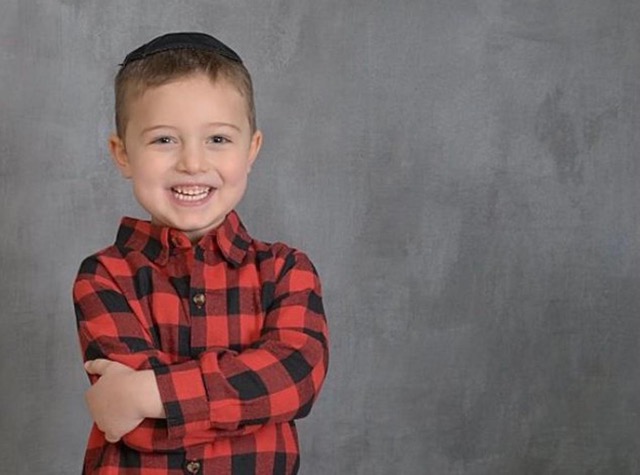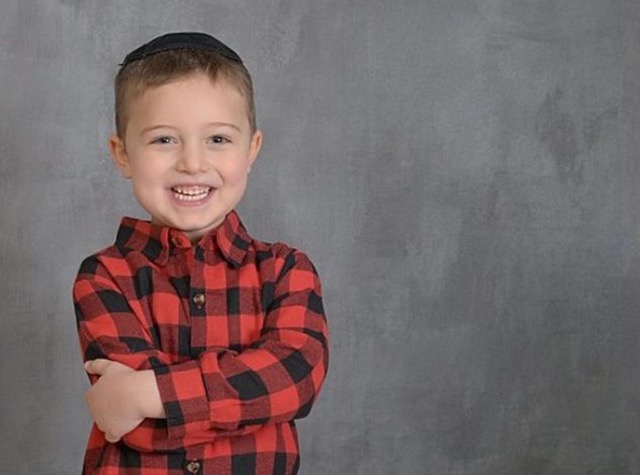Five-year-old Rafi Meles likes the outdoors, his scooter, animals and technology. He loves to go to shul and is fascinated with how things, like the human heart, work. He’s bright, inquisitive and intuitive and can easily connect with children both younger and older. His parents, Dina and Dovi Meles, often joke that he is growing up too fast because, as an infant, he skipped his crawling stage, preferring to walk right away.
Ever since Rafi was a baby, he would get sick constantly. It wasn’t just the frequency of his illnesses that was concerning to his parents, but also the duration of them. At first pediatricians attributed his constant stream of viruses and infections to daycare and regular exposure to other children. Consultations with a long roster of specialists, from allergists to pulmonologists, often yielded the explanation that Rafi will simply “grow out of it.”
However, for Dina and Dovi, that explanation fell way short of adequate, and they knew in their hearts that something just wasn’t right. “This is not normal. Kids don’t get 104-degree fever every few weeks without a reason,” Dovi said. And one thing was certain—the other kids in Rafi’s daycare definitely were not getting as sick and as often as he was, waging a never-ending battle against fevers, infections and pneumonia.
During one particularly bad bout, where Rafi’s fever was unusually high—even for him—a pediatrician in their practice suggested that the Meleses consult with an immunologist at Children’s Hospital of Philadelphia, familiarly known as CHOP.
AT CHOP, doctors performed a battery of tests and labs, which all seemed to point to a common variable immune deficiency. Then they watched Rafi for about two years.
About six months ago, Rafi’s lab and test results were starting to bear some resemblance to a state of normalcy, which led his team of doctors to speculate if perhaps it was simply a case of a delayed maturity of his immune system—something that typically occurs around the age of 4. Rafi was already 5 years old at the time.
Just to be sure they were not missing anything, the doctors at CHOP asked the Meleses’ if they could perform genetic testing. They obliged, and soon enough the Meleses and their team of doctors had their answer: Rafi had X-linked Lymphoproliferative Syndrome, or XLP1, a very rare and potentially life-threatening genetic disorder that causes the immune system to respond abnormally to certain viral infections, ultimately leading to a whole host of health complications.
In fact, XLP is so rare that only 150 families worldwide have been officially diagnosed with this condition. Currently, the only known available cure is a bone marrow transplant.
About 70% of children diagnosed with XLP don’t typically live past the age of 10 or 11. Once doctors make the diagnosis it is usually too late. “Every day … he’s not getting sick is a bracha,” his mother said. “As for the bone-marrow transplant, doctors would like to perform it while Rafi is relatively healthy and in a good frame of mind.”
Besides his positive attitude and bright smile, Rafi has a fairly impressive comprehension of immunity for his age. “When we check his blood he understands it as having soldiers in his body,” his father explained. “They need to be checked every so often to make sure he has soldiers … who are able to fight infections and viruses.” When his parents perform these blood checks, they tell him that they are doing it to see if his “soldiers” are still strong.
“Obviously, every day that he’s healthy is another day we dodge a bullet,” Dina said. “Because of this genetic disorder—if he were to catch anything from the Epstein-Barr virus family he could ultimately go into organ failure and likely not make it.”
Rafi was very excited to go to Camp Gan Israel this summer and Kohelet Yeshiva in September. All that is on hold for now since putting him in a new environment would be too risky. Dina said, “It’s almost like living the COVID life continuously. Even though the restrictions are lifting for the rest of the world, we kind of have to tighten down a little more because all the masks are coming off and we don’t know where anyone’s going.”
Dovi explained, “There’s an extreme hesitation … of everyone kind of going back to normal because we know that’s just going to challenge him in new ways.” Ironically, COVID may have saved Rafi with the help of masks and social-distancing guidelines. Except that for Rafi, masks and social distancing will continue to be in his life for the foreseeable future. And even with a successful intervention it will still be a long journey to normalcy. “They say it’s a marathon, not a sprint.”
Despite the worrisome outlook, Dina and Dovi Meles managed to find a silver lining. With a 50% chance that Rafi’s younger two brothers could also have XLP1, both tested negative for the genetic disorder. Best of all, Rafi’s 10-month-old baby brother is an exact match as a bone-marrow donor—the ultimate brother’s keeper.
While their medical insurance will cover much of the actual medical expenses, it’s the expenses that go far beyond medical needs, from tutoring and educational needs to supplementing the costs as the Meles’ income dwindles from two full-time working parents to just one. They are hoping to offset the impending deficit and hardship that inevitably comes with a severe illness like this. “There’s such limitations for when it comes to very rare diseases—genetic diseases—so that’s why we’re looking at alternate ways to create a fund for him that would help offset a lot of the financial burden,” Dovi explained.
Given the incredible financial burden this situation will place on the family, Dina and Dovi Meles have partnered with the Young Israel of Cherry Hill to establish an emergency assistance fund. Those interested in contributing to this cause are encouraged to use the link below to donate directly. All donations are tax deductible. https://thechesedfund.com/melesfamily











